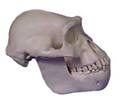 |
You're a major, NOW what? Careers in BioAnthro
Here are two brochures sponsored by the American Association of Physical Anthropologists, plus some UCSD-specific comments. I have added a few links to make them interactive, but otherwise the brochures are as printed by the AAPA.
|
 |
DISCLAIMER
The links I have inserted are not necessarily definitive, nor endorsed by the AAPA; they take you to sites that help illustrate the topic, that's all. Caveat emptor!
|
A Career in Biological Anthropology |
This AAPA brochure written mainly for high-school or 1st-year students, pretty basic but a good introduction to the field, and talks a bit about academic careers.
|
|
Non-Academic Careers in Physical Anthropology | This AAPA brochure is intended for folks who have more background in BioAnthro (most people use "biological anthro" and "physical anthro" interchangeably, though the former implies more emphasis on developmental/physiological focus, the later on bones and measurement).
|
|
UCSD-specific career comments | Some free opinions from Jim Moore, worth every cent! ;-)
|
|
UCSD majors' survey | Switch over to the main Anthro page for some actual survey data on what our majors have gone on to do.
|
For those of you who still cling to print, a couple of (hopefully) useful books:
Ryan, A. S. (2002). A guide to careers in physical anthropology. Westport, Conn.: Bergin & Garvey.
- Contents
- Meaning of physical anthropology / Alan S. Ryan
Teaching physical anthropology in a university : the traditional career / Curtis W. Wienker
Teaching physical anthropology in the community college / Philip L. Stein
Practice of physical anthropology in a museum environment / Douglas H. Ubelaker
Paleoanthropology at home and in the field / Andrew Kramer
Primatology as a career / Kevin D. Hunt
Post-doc experience : is there a light at the end of the tunnel? / Anne C. Stone
Krogman, his cleft palate collection, and me : or, what can an auxiologist do today? / Evelyn J. Bowers-Bienkowski
Teaching anatomy at a university / Mark F. Teaford
Research faculty in medical, nursing, and public health schools / Stephen T. McGarvey and Gary D. James
Physical anthropology, medical genetics, and research / Bert B. Little
Opportunities in public health and international nutrition / Reynaldo Martorell
Having fun -- a jock in two worlds : kinesiology and human biology / Robert M. Malina
Government research : links to biomedicine and public health / Ralph M. Garruto
Private industry : research for profit / Alan S. Ryan
Independent consulting : making your own rules / Marilyn R. London
Journalism : bringing science to the public / Kate Wong
Forensic science as a new arena for a human biologist / Moses S. Schanfield
(it's at UCSD, call number GN62 .G85 2002)
and
Camenson, B. (2000). Great Jobs for Anthropology Majors. Chicago: VGM Career Horizons.
- There are several copies of this around the department in the Spiro Library and in main office.
While it's thin on specifics, you might be interested in an article one of our grad students received from her parents. It's dated 2/21/99, Gannett News Service, but the actual newspaper isn't given. Exerpts:
In business, it's often a
matter of degree
-
Don't throw away the MBA degree yet.
But as companies go global and crave leaders for a diverse work force, a new hot degree is emerging for aspiring executives: anthropology.
The study of man [sic] is not longer a degree for museum directors.
Citicorp created a vice presidency for anthropologist Steve Barnett, who discovered early warning signs to identify people who don't pay credit card bills.
Not satisfied with consumer surveys, Hallmark is sending anthroplogists into the homes of immigrants, attending holidays and birthday parties to design cards they'll want.
The article also mentions e.g. anthropologists observing women shaving their legs, to advise on razor design. Hey, it's a living! Apparently there is one undergrad degree in anthro for every 26 in business, and 1 anthro PhD for every 235 MBAs; I'm interpolating here, but let's assume an anthro degree is worth 5% of a business degree to a business. At that rate, an anthro major would have a slight edge over a business major, and the average PhD would win over the average MBA every time!
It mentions a Motorola corporate lawyer who got an anthro degree before law school, and cites Ken Erickson of the Center for Ethnographic Research as one of the authorities on the area. Advising corporations "takes trained observation, which is what anthropologists are trained to do."
Back to BioAnthro at UCSD

